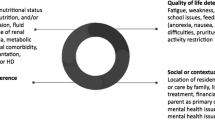Abstract
Purpose
The 1-year mortality rate of patients with end-stage renal disease (ESRD) on renal replacement therapy (RRT) is 20–25% comparable to many cancers. Studies have shown that cancer patients commonly overestimate their likelihood of survival relative to their physicians. It is unclear if this translates into other terminal illnesses.
Methods
Adult and elderly patients with ESRD on RRT without cognitive defect were interviewed to evaluate their prognostic estimates at 1 and 5 years. Past medical history and demographic data was abstracted from their medical charts. Each patient’s proper nephrologist was then interviewed regarding his proper prognostic estimate for this patient. Both the patient and the nephrologist’s estimates were compared and a difference of greater than 20% was defined as the threshold for prognostic concordance.
Results
77% of patients were found to be in prognostic discordance with their nephrologists. This group was older, had more comorbidities, a lower albumin level and a poorer prognosis. The majority of patients were in disagreement with their nephrologists regarding whether a discussion about prognosis had taken place. The choice of end of life care for 55% of patients was focused on relieving pain and discomfort.
Conclusion
Communication of prognosis and discussions related to life expectancy and end of life care are lacking in the routine care of ESRD patients. ESRD patients therefore tend to overestimate their prognosis which might lead to overutilization of invasive procedures with increased acute healthcare costs as well as a delay in instigation of palliative or hospice measures.
Similar content being viewed by others
References
Saran R, Li Y, Robinson B et al (2016) US Renal Data System 2015 Annual Data Report: Epidemiology of Kidney Disease in the United States. Am J Kidney Dis Off J Natl Kidney Found 67:S1–S305 (Svii)
Kurella Tamura M, Covinsky KE, Chertow GM et al (2009) Functional status of elderly adults before and after initiation of dialysis. N Engl J Med 361:1539–1547
Davison SN (2010) End-of-life care preferences and needs: perceptions of patients with chronic kidney disease. Clin J Am Soc Nephrol 5:195–204
Wong SPY, Kreuter W, O’Hare AM (2012) Treatment intensity at the end of life in older adults receiving long-term dialysis. Arch Intern Med 172:661–663 (discussion 663–664)
Wachterman MW, Marcantonio ER, Davis RB et al (2013) Relationship between the prognostic expectations of seriously ill patients undergoing hemodialysis and their nephrologists. JAMA Intern Med 173:1206
Thamer M, Kaufman JS, Zhang Y et al (2015) Predicting early death among elderly dialysis patients: development and validation of a risk score to assist shared decision making for dialysis initiation. Am J Kidney Dis 66:1024–1032
Beddhu S, Bruns FJ, Saul M et al (2000) A simple comorbidity scale predicts clinical outcomes and costs in dialysis patients. Am J Med 108:609–613
Koncicki HM, Schell JO (2016) Communication skills and decision making for elderly patients with advanced kidney disease: a guide for nephrologists. Am J Kidney Dis 67:688–695
Cohen RA, Jackson VA, Norwich D et al (2016) A nephrology fellows’ communication skills course: an educational quality improvement report. Am J Kidney Dis 68:203–211
Funding
This research received no specific grant from any funding agency in the public, commercial, or not-for-profit sectors.
Author information
Authors and Affiliations
Contributions
SG designed the study, helped in the acquisition of data, drafted the article, and analyzed the data; SH, NF, and SS helped in the acquisition of the data; EG helped analyze the data and helped complete the manuscript, FF helped with the design of the study and revised the manuscript; all authors approved the final version of the manuscript.
Corresponding author
Ethics declarations
Conflict of interest
The authors declare that there is no conflict of interest.
Additional information
Publisher's Note
Springer Nature remains neutral with regard to jurisdictional claims in published maps and institutional affiliations.
Rights and permissions
About this article
Cite this article
Ghanem, S., Hossri, S., Fuca, N. et al. Patient-nephrologist prognostic awareness and discordance in end stage renal disease on renal replacement therapy. Int Urol Nephrol 52, 765–773 (2020). https://doi.org/10.1007/s11255-020-02420-2
Received:
Accepted:
Published:
Issue Date:
DOI: https://doi.org/10.1007/s11255-020-02420-2




